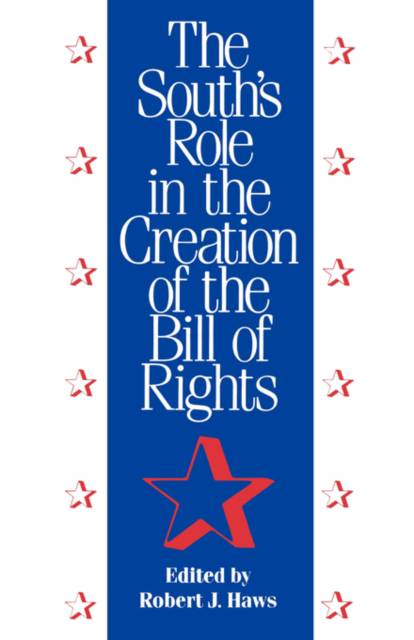
- Retrait gratuit dans votre magasin Club
- 7.000.000 titres dans notre catalogue
- Payer en toute sécurité
- Toujours un magasin près de chez vous
- Retrait gratuit dans votre magasin Club
- 7.000.0000 titres dans notre catalogue
- Payer en toute sécurité
- Toujours un magasin près de chez vous
The South's Role in the Creation of the Bill of Rights
59,45 €
+ 118 points
Description
The South's Role in the Creation of the Bill of Rights edited by Robert J. Haws The adoption of the Bill of Rights was the last step in defining the essential elements of American constitutionalism. The process began with the writing of the Constitution, continued through its ratification by the states, and culminated with the adoption of the Bill of Rights. In 1991 the bicentennial of the adoption of the Bill of Rights provided an occasion for examining the origins of this most important statement of individual rights in American history. Published on this anniversary, The South's Role in the Creation of the Bill of Rights sheds light on the paradoxical part the South played in the process of drafting and adopting this document. In cogent essays from the Chancellor's Symposium on Southern History held at the University of Mississippi in 1898 six noted experts in legal, constitutional, and southern history fill a gap in the literature of southern legal history for the period 1787-1791. The southern role is particularly important because political leaders in the South took the lead in promoting a bill of rights and at the same time vociferously defended the right to hold slaves. The essays in this book comprise a complete discussion of the writing and ratification of the Constitution and the adoption of the Bill of Rights in five southern seaboard states. They reveal the interplay of a desire to protect states' rights, a concern for the preservation of individual liberty, and a defensive attitude toward slavery that governed southern attitudes. These concerns dominated constitutional discourse until the Civil War. The South's peculiar "cultural constitutionalism" was first given definition in this period of American history, and as this book reveals, it initiated the process of setting the region apart from the rest of the United States. The events of these years were a necessary first step in establishing a southern regional identity. Robert J. Haws is Chair of the Department of Public Policy Leadership at the University of Mississippi.
Spécifications
Parties prenantes
- Editeur:
Contenu
- Nombre de pages :
- 196
- Langue:
- Anglais
- Collection :
Caractéristiques
- EAN:
- 9781604732627
- Date de parution :
- 01-04-91
- Format:
- Livre broché
- Format numérique:
- Trade paperback (VS)
- Dimensions :
- 140 mm x 216 mm
- Poids :
- 254 g

Les avis
Nous publions uniquement les avis qui respectent les conditions requises. Consultez nos conditions pour les avis.





